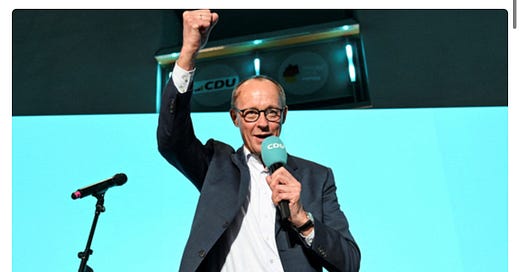Germany's Conservative Victory: Friedrich Merz Set to Lead Coalition Government
Victory alone does not guarantee governance. The real challenge for Merz now begins—piecing together a coalition that can function within the constraints of Germany’s political framework.
A gust of change has swept through Germany’s political landscape. As election night results solidified, the conservative Christian Democratic Union (CDU) leader Friedrich Merz emerged as the man poised to reshape the country’s trajectory. The numbers told a clear story: the CDU/CSU alliance clinched roughly 28.5% of the vote, securing a return to power. But this wasn’t just a conservative resurgence—it was a stark recalibration of Germany’s political equilibrium.
For the first time, the far-right Alternative for Germany (AfD) surged to an unprecedented 20.8%, making it the second-largest force in the Bundestag. The center-left Social Democratic Party (SPD), the party of outgoing Chancellor Olaf Scholz, suffered a bruising defeat, tumbling to 16.4%. The message from voters was deafening: change was not only desired but demanded.
Yet, victory alone does not guarantee governance. The real challenge for Merz now begins—piecing together a coalition that can function within the constraints of Germany’s political framework. Traditional parties have long shunned the AfD, branding them politically toxic due to their hard-right stance on immigration and national identity. That leaves Merz with limited options: a coalition with the SPD or an alternative alliance that can withstand the ideological fractures running through the electorate.
Merz, a man known for his economic conservatism and corporate acumen, wasted no time in setting the stage. He vowed to have a government in place by mid-April, emphasizing an urgent need to address key issues—migration policy, economic growth, and national security. But securing the chancellery is only the first step. Governing a fragmented Germany in a volatile European landscape presents a formidable test.
The AfD’s rise, particularly in former East German states, underscores a widening chasm in public sentiment. Economic dissatisfaction, fears over migration, and frustration with what many see as a distant political elite have fueled the party’s ascent. AfD leader Alice Weidel has made overtures toward coalition talks, but CDU leadership remains firm in its refusal to legitimize the far-right party with a governing partnership.
German election: AfD nearly doubles support from last election
International reactions have been mixed. Some European leaders extended congratulations to Merz, signaling relief that a center-right government would lead Germany rather than a radical alternative. Others, however, voiced concerns over the AfD’s growing influence and what it could mean for the European Union’s stability. As Berlin prepares for its new leadership, the broader question looms—how will Germany, a pillar of European politics, navigate its internal fractures while maintaining its role on the global stage?
Merz’s moment has arrived, but it comes with high stakes. The electorate has delivered its verdict, but governance is a different battlefield. The coming weeks will test not just his ability to negotiate, but his capacity to unify a Germany more divided than it has been in decades. The coalition he builds will determine whether this victory marks a turning point—or a prelude to deeper political turbulence.




